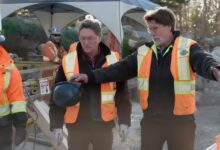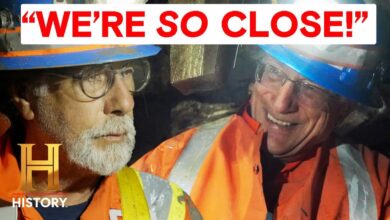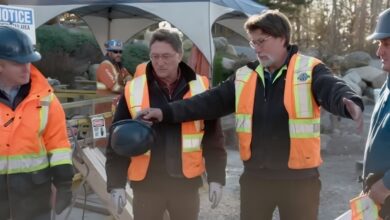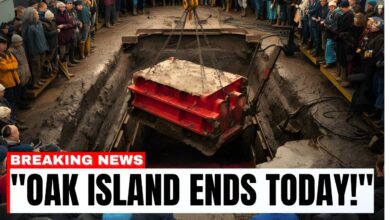Marty Lagina Just Discovered A Hidden Treasure Deep Inside Oak Island Tunnel !!
Marty Lagina Just Discovered A Hidden Treasure Deep Inside Oak Island Tunnel !!

Wow, uh, what is going on in this swamp? Was I surprised? Yes. These dates of 1710 to 1790 that Carmen Lake gave us for this strap on a ship are actually scary to me. Because as I sit here right now, I’m more or less certain that something significant happened here in the mid-1700s.
Just 3 minutes ago, Rick and Marty Lagina may have finally hit the jackpot deep within the tunnels of Oak Island. For 8 years, they’ve been tirelessly excavating this enigmatic location, driven by tales of treasure buried by Spanish pirates, British soldiers, or perhaps the mysterious Knights Templar.
Their most tantalizing clue came when they drained the swamp and unearthed an ancient spike dating back 300 years, and possibly linked to a Spanish galleon. What if this spike is just the beginning, and beneath it lies something even more sinister?
Let us explore the most massive of treasures on this haunted island: the sunken secrets of Nova Scotia’s hidden isle.
For over 8 years, Rick and Marty Lagina, along with their dedicated team, have been excavating on Nova Scotia’s Oak Island, fueled by the enticing prospect of uncovering hidden riches. However, they still don’t know who might have buried treasure there in the first place. Were the culprits Spanish pirates, British soldiers, or possibly the Knights Templar?
Moreover, the question arises: why anyone would go through the trouble of burying valuables on such a secluded island?
As the digging continues, public interest remains high, drawing us deeper into the activities on Oak Island, where each discovery is touted as potentially significant. Rick, convinced of its complexity, commands the draining of the swamp, believing that it may yield some answers.
Once the water is lowered, Gary takes over with his metal detector. Beneath a wooden board, he detects something intriguing. After some digging, the team unearths an old spike resembling those used on Spanish ships from the late 1600s to early 1700s.
Believing it to be the first human touch it has received in about 300 years, veteran treasure hunters like Fred Nolan have suggested that the swamp, peculiarly shaped into a triangle, might have been deliberately constructed long ago to cover up an old ship.
This idea spawns further speculation: could it have been the work of Spanish pirates using the swamp as a giant hiding spot?
The team hopes that exploring this previously inaccessible part of the swamp will reveal physical evidence to support the theory that it was artificially made. The importance of excavating the Nolan side of the swamp stems from Fred Nolan’s long-held belief that it might be central to solving the puzzle of the island. Could there be a sunken ship or a concealed vault there?
During one of their digs, Rick comes across a log with a sharpened end, suggesting that more than one person was involved in its placement, possibly indicating human alteration of the environment.
To navigate the muddy terrain of the drained swamp, the team sets up a grid for better management and uses metal detectors in areas where the soil is soft. On one such occasion, Gary’s detector signals something not far below the surface.
Eagerly, they dig and unearth a large, weathered iron object, possibly a piece of a larger item. Examining the artifact, they notice distinctive grooves and bends, speculating it could be a part of a chest or perhaps a bracket from a ship.
Standing at the edge of the island, they let their imaginations wander to visions of sunken ships filled with wealth. Among the new finds is a piece of charred wood embedded in the iron, suggesting the possibility of a ship intentionally set on fire and sunk in the swamp. Why would someone destroy a ship in this manner? The action implies an attempt to hide something valuable or important.
In the southeastern part of the swamp, the team discovers what looks like a stone pathway, or perhaps a part of a ship’s stock, buried under the mud and water. This significant find sparks a flurry of discussions about its historical implications.
Dr. Spooner suggests that the stone layer they uncovered dates back to the early 1700s, possibly indicating that the pathway was used for transporting valuable goods.
The team’s next find with their metal detectors is about to change everything: the Money Pit’s hidden structures. Gary and his teammate continue their search with metal detectors, their excitement mounting with each signal. They soon uncover an ancient pin, its surface weathered by time.
The pin resembles a plum bob, a tool used in building and surveying for centuries. This discovery leads to speculation about its origins and possible connection to early colonial activities, or even earlier times.
As the group gathers around the newly found pin, they consider its importance and how it might link to other historical finds or structures on the island. Nearby, a wooden structure starts to emerge from the muddy ground, raising questions about its relationship to the legendary Money Pit.
The team anxiously awaits a report from Steve Gibil, the surveyor, hoping his findings might provide the breakthrough they need. With renewed determination, they press on with their exploration, driven by the hope of uncovering the long-sought answers about Oak Island.
Careful not to overstate the significance of each discovery as conclusive evidence, Steve started his briefing by noting the similarities between the old cobblestone path uncovered last year and the new cobbles they were currently standing on. He pointed out how these matched the surrounding land levels quite closely, suggesting they were purposefully aligned to head north toward the Money Pit’s grid C1.
This path alignment sparked curiosity among the team members, leading them to wonder about its intended purpose and whether it was deliberately aimed in that direction. Rick, Alex, Peter, and Doug gathered around what appeared to be an ancient Roman stone road. Their interest was clear as they discussed why such a path would exist in a boggy area and speculated about the immense effort that must have gone into constructing it.
This path was remarkably similar to one they had previously found in the Oak Island swamp, which led them to consider if Roman road-building techniques had influenced broader architectural traditions, possibly even affecting the Portuguese, who were connected with the Knights of Christ.
Driven by this idea, the team eagerly compared different construction methods, hoping to find any ties between Portuguese historical explorations and Oak Island. They believe that identifying these connections might provide valuable insights into the region’s past, offering a clearer understanding of the motivations behind such constructions.
Elsewhere, the ongoing work in the swamp was just one among many attempts to understand the complexities of Oak Island. Over at the Money Pit area, Rick, Marty, and other team members were analyzing new sonar data that hinted at man-made structures deep within Aladdin’s cave. Steve noted that the straight lines shown in the sonar images didn’t appear natural, and he was hopeful that viewing them in a 3D model would offer more clarity.
Terry Ma suggested that learning about these structures’ construction methods might reveal significant information about historical excavation and building techniques in the area. During a review session of the sonar data, Rick spotted something unusual and asked Paul to adjust the orientation of the image. As the image shifted, Terry noticed a sandy slope that might be covering other important findings.
Marty observed a perfectly square wall on one side of the cave, concluding that it must be man-made and could potentially be hiding a treasure trove. Their discoveries deepen, pushing them to dig further into the island’s secrets.
Inside Aladdin’s cave, the team then deliberated on how to access deeper into the cave, considering drilling toward a subtle echo that seemed to indicate another opening. They planned to lower a camera into the drill hole, hoping it would reveal more details about the cave’s interior and possibly guide their subsequent actions. Rick emphasized the need for a careful assessment before moving forward.
The next day, they started drilling a new bur hole named L3.5 to gather more data from Aladdin’s cave. At the same time, efforts were underway to manage the influx of water into the garden shaft, showcasing the continual struggle against natural elements in their quest.
Meanwhile, at the interpretive center, Craig Tester, Peter Fornetti, Jack Begley, and Aro metallurgist Emma Culligan consulted with blacksmith expert Carmen Leg about intriguing artifacts from Lot 5: a metal strap and a heavy fastener. These were thought to possibly belong to a 17th-century chest or trunk. Carmen’s examination, combined with Emma’s detailed scans, revealed features consistent with a clasp from a small chest, corroborating the suspected time frame and adding another layer of historical context to their findings.
Another part of the site: archaeologists Helen Sheldon and Moya MacDonald were investigating changes in the soil composition on Lot 5. Their excavation led to the discovery of what looked like a barrel strap with an attached nail, which exhibited a greenish tint—a sign of copper use, known for its resistance to corrosion. This find connected back to earlier discoveries of wooden cargo barrels near the stone road or ship’s pier in the swamp, suggesting a historical operation that might have used the swamp as an open harbor for transferring goods to the Money Pit.
These discoveries prompted the team to speculate about the strategic importance of Lot 5 in the broader context of Oak Island’s past activities. They hypothesized that this area might have served as a staging ground for the constructions and operations around the Money Pit, adding another piece to the puzzle of human activity on the island. Their discussions and findings continued to fuel their enthusiasm as they pieced together the historical narrative of Oak Island.
As the artifact was safely stored for later examination by Emma, Jack joined Helen and Moya in searching the area for historical clues on the island. Though it was uncertain whether their efforts would yield any notable discoveries, meanwhile, those at the Money Pit were filled with anticipation as they awaited the results from bur








